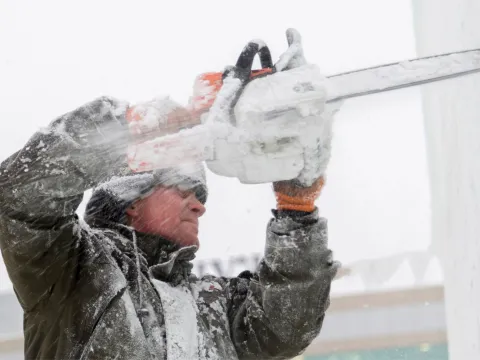- AdventHealth

When winter storms impact our communities nationwide, it’s important to take the steps to protect yourself at work, including preventing hypothermia and recognizing if you’re experiencing a dangerous reaction to the cold temperatures.
Professionals like firefighters and police officers are tasked with facing the elements at any given time as they care for our communities. That makes them especially vulnerable to the risk of developing hypothermia during winter storms. AdventHealth Centra Care is here to help.
What Is Hypothermia?
Hypothermia is caused by being in cold temperatures for a prolonged amount of time. When this happens, your body begins to lose heat faster than it’s being produced. The longer your body is too cold, the more stored energy your body will use, eventually leading to a lower body temperature.
Preventing Hypothermia
Hypothermia is most likely to occur in very cold temperatures, but it can also happen above 40°F if a person becomes chilled from rain, sweat, etc. The best way to prevent hypothermia is to stay warm and dry, though that can be difficult for many during winter storms.
Pay attention to weather reports and warnings of freezing weather, including winter storms, so that you can best prepare for inclement weather.
Ready.gov, a national public service organization, suggests preparing your home to keep out the cold with insulation, caulking and weather stripping. They also suggest to:
- Gather supplies in case you need to stay home for several days without power
- Have extra batteries for radios and flashlights
- Install and test smoke alarms and carbon monoxide detectors with battery backups
- Keep in mind each person’s specific needs, including medication
- Learn how to keep pipes from freezing
- Remember the needs of your pets
Create an Emergency Kit for Your Car
Before bad weather hits and you’re preparing at home, don’t forget about your car. Keep the gas tank full and create an emergency supply kit that includes jumper cables, sand, a flashlight, warm clothes, blankets, bottled water and non-perishable snacks. In case of loss of power inside, your car back-up plan can help provide warmth at least temporarily.
Risks and Warning Signs of Hypothermia
Though you can take some steps to protect yourself and your team members during a winter storm, sometimes a situation is beyond our control. It’s especially important to watch for the warning signs that your health may be in danger.
When the body experiences a drop in temperature, it starts to impact the brain, leading you to notice signs and symptoms that you’re going into hypothermia, including:
- Clumsiness
- Confusion
- Drowsiness
- Fumbling hands
- Shivering
- Slow, shallow breathing
- Slurred speech or mumbling
- Weak pulse
Act Quickly
If you or a team member starts to experience any of the hypothermia warning signs, visit an emergency room or urgent care right away. If you’re not able to get medical help immediately, try to warm yourself or your team member up by:
- Seeking shelter in a warm room
- Removing any wet clothing
- Warming the center of the body, such as the chest, neck and head, using a warm blanket or skin-to-skin contact under loose, dry layers of fabric, such as a blanket
- Drinking a warm beverage
In the event someone you know gets severe hypothermia and becomes unconscious, do not try to give them anything to drink, keep them warm, and perform CPR until the person responds or you can get them to a medical professional.
We Help Keep Your Employees Safe and Well
We know how valuable your team members are to you and your business. With more than 40 years of experience, our occupational health services at AdventHealth Centra Care will provide your employees the expert, experienced care they deserve to keep working safely, efficiently and well, including amid winter storms. We can provide immunizations and anything else you need to stay safe and well.
AdventHealth Centra Care provides a wide range of occupational health services to both public and private employers. Visit us here to learn how we can support your employees’ well-being in body, mind and spirit.


